

How College Students Battled Textbook Publishers To A Draw, In 3 Graphs : Planet Money. College textbooks are expensive.
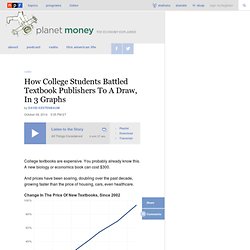
You probably already know this. A new biology or economics book can cost $300. And prices have been soaring, doubling over the past decade, growing faster than the price of housing, cars, even healthcare. But, surprisingly, the amount students actually spend on textbooks has not been rising. In fact the best data we could find on this shows students have been spending a bit less over time. How is this possible? That last chart actually helps explain the first one showing prices for new books going through the roof. One textbook executive told me the way out of all this, is to replace textbooks with something better and cheaper — educational software. Lumen Learning. Oxford-university-press-teams-up-with-chinas-largest-e-school-hujiang-260661581. SHANGHAI, May 26, 2014 /PRNewswire/ -- Oxford University Press representative Paul Riley visited Chinese online school Hujiang on May 15th, 2014 to sign an MOU, the first step in a series of strategic collaborations between the two groups.
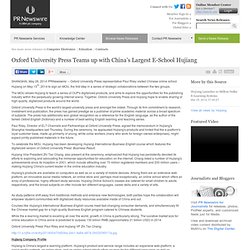
The MOU allows Hujiang to teach a series of OUP's digitalized products, and aims to explore the opportunities for the publishing industry within the perpetually growing internet arena. Together, Oxford University Press and Hujiang hope to enable sharing of high-quality, digitalized products around the world. Oxford University Press is the world's largest university press and amongst the oldest. Through its firm commitment to research, investment and publication, the press has gained prestige as a publisher of prime academic material across a broad spectrum of subjects. Paul Riley, Director of ELT Channels and Partnerships at Oxford University Press, signed the memorandum in Hujiang's Shanghai headquarters last Thursday. Hujiang Company Profile. Inkling Drops Digital Textbook Sales @insidehighered. About Us - Soomo Publishing.
We are digital craftsmen with a passion for education, including editors, graphic artists, web developers, filmmakers, and instructional designers.
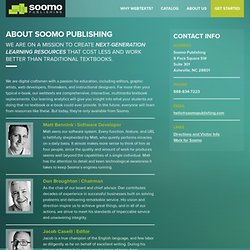
Far more than your typical e-book, our webtexts are comprehensive, interactive, multimedia textbook replacements. Our learning analytics will give you insight into what your students are doing that no textbook or e-book could ever provide. In the future, everyone will learn from resources like these. But today, they're only available from Soomo.
Matt Bennink | Software Developer Matt owns our software system. Dan Broughton | Chairman As the chair of our board and chief advisor, Dan contributes decades of experience in successful businesses built on solving problems and delivering remarkable service. Jacob Caselli | Editor Jacob is a true champion of the English language, and few labor as diligently as he on behalf of excellent writing. Zara Elizabeth Crockett | Product Manager Will Goldsmith | Project Manager Andrea Moschetti | Office Coordinator. S "Faculty Metamorphosis" Trend Report.
Is it Time for Content Strategy in Digital Higher Education? Share this post Instructional content in higher education used to be a simple matter: the Instructor selected a textbook (or three), maybe put together a set of photocopied readings, and added his or her own course notes.
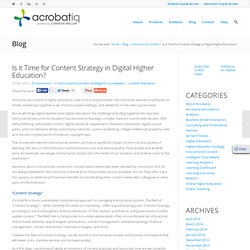
But as all-things-digital washes over higher education, the challenge of pulling together the very best instructional resources for students has become increasingly complex. Why Can't E-Books Disrupt The Lucrative College Textbook Business? College students today stream movies from Netflix, queue up music on Spotify, and order late-night snacks on Seamless.
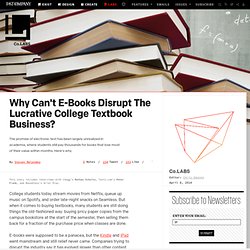
But when it comes to buying textbooks, many students are still doing things the old-fashioned way: buying pricy paper copies from the campus bookstore at the start of the semester, then selling them back for a fraction of the purchase price when classes are done. E-books were supposed to be a panacea, but the Kindle and iPad went mainstream and still relief never came. Companies trying to disrupt the industry say it has evolved slower than other content fields because the market is more indirect. You see, textbook publishers market to professors who pick the books, not students who pay for them--where Apple and Amazon have traditionally directed their marketing.
The key to innovation, these companies say, is to not try to beat the big publishing houses at their own game. Little Interest in E-Textbooks Among U. of Iowa Students. Textbook prices still crippling students, report says. Despite some recent improvement in textbook market options and transparency, rising prices continue to hinder students who, in the worst scenarios, are turning down classes because the materials are too expensive.
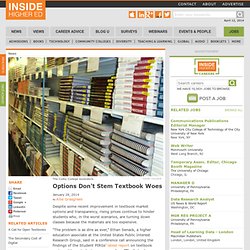
“The problem is as dire as ever,” Ethan Senack, a higher education associate at the United States Public Interest Research Group, said in a conference call announcing the findings of the Student PIRGs’ latest report on textbook costs and how students are responding. “The federal government, states and most important, individual campuses, need to support and invest in alternatives outside of the traditional textbook market.”
Another 48 percent of students said the cost of textbooks affected how many and which classes they took each semester. At the same time, 82 percent of students said free online access to a textbook (with the option of buying a hard copy) would help them do “significantly better” in a course.